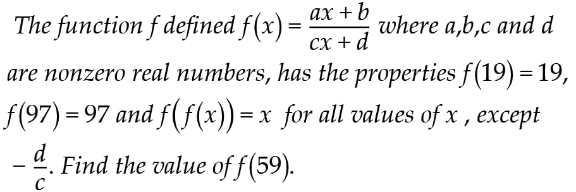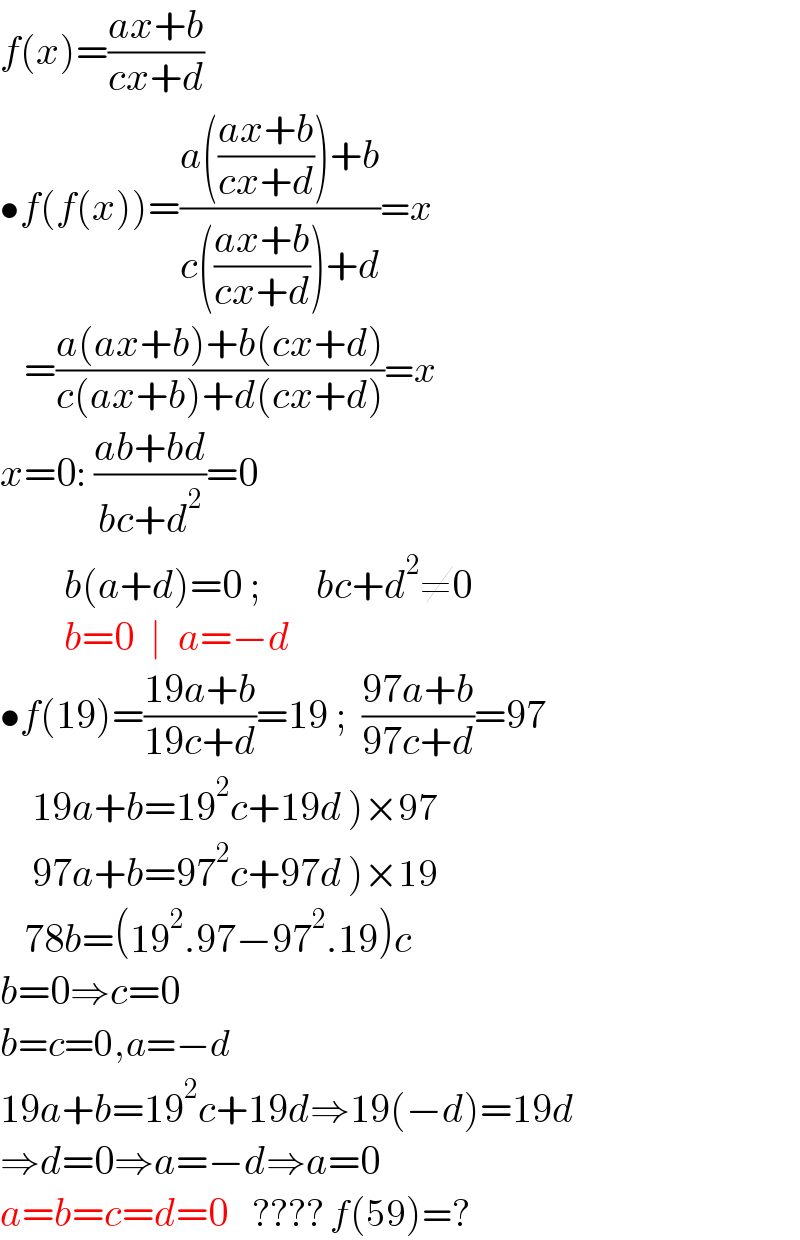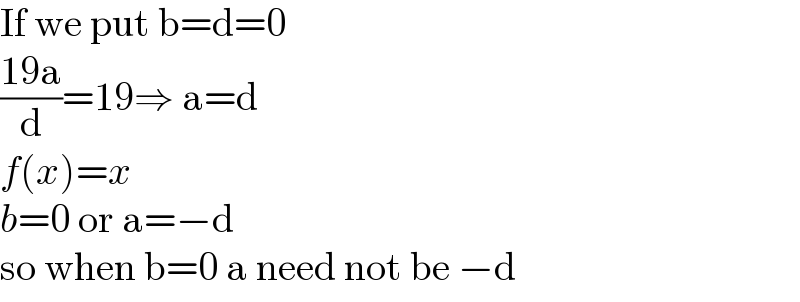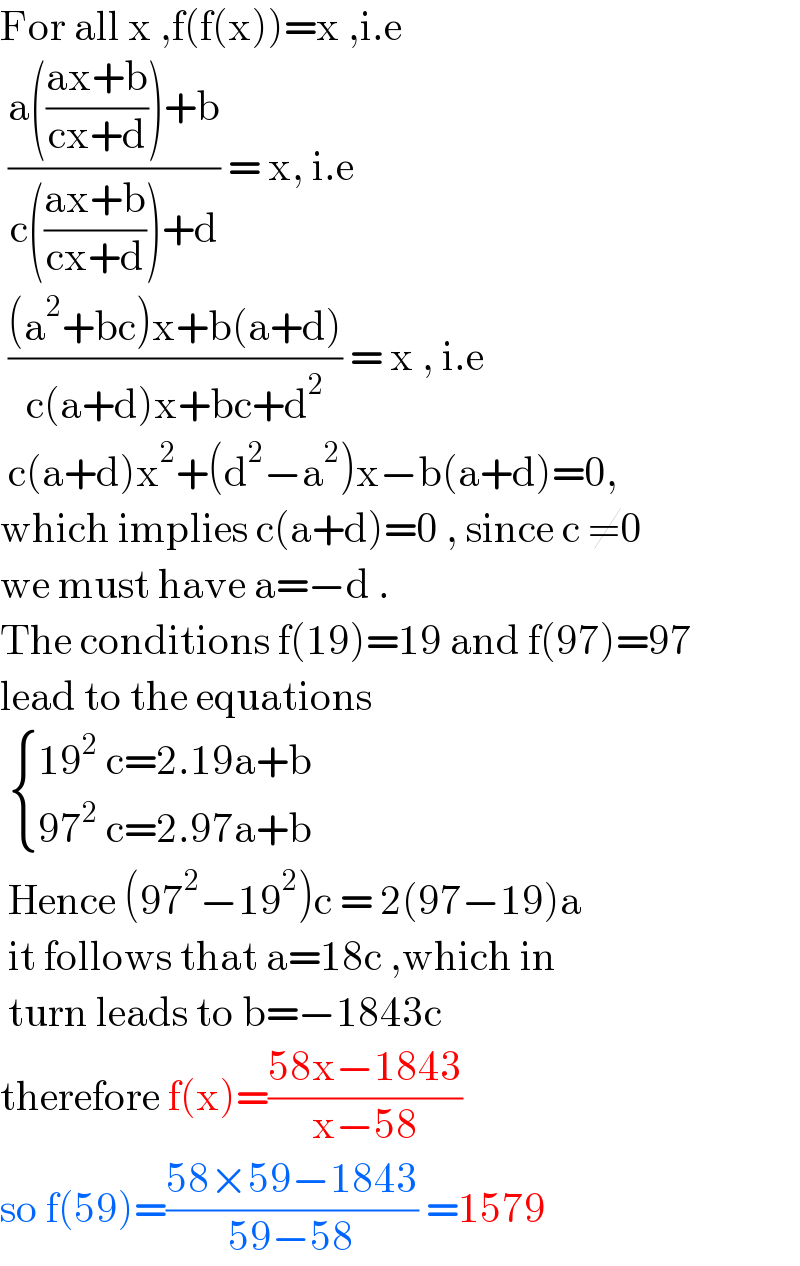Question Number 152151 by john_santu last updated on 26/Aug/21

Answered by Rasheed.Sindhi last updated on 26/Aug/21

$${f}\left({x}\right)=\frac{{ax}+{b}}{{cx}+{d}} \\ $$$$\bullet{f}\left({f}\left({x}\right)\right)=\frac{{a}\left(\frac{{ax}+{b}}{{cx}+{d}}\right)+{b}}{{c}\left(\frac{{ax}+{b}}{{cx}+{d}}\right)+{d}}={x} \\ $$$$\:\:\:=\frac{{a}\left({ax}+{b}\right)+{b}\left({cx}+{d}\right)}{{c}\left({ax}+{b}\right)+{d}\left({cx}+{d}\right)}={x} \\ $$$${x}=\mathrm{0}:\:\frac{{ab}+{bd}}{{bc}+{d}^{\mathrm{2}} }=\mathrm{0} \\ $$$$\:\:\:\:\:\:\:\:{b}\left({a}+{d}\right)=\mathrm{0}\:;\:\:\:\:\:\:\:{bc}+{d}^{\mathrm{2}} \neq\mathrm{0} \\ $$$$\:\:\:\:\:\:\:\:{b}=\mathrm{0}\:\:\mid\:\:{a}=−{d} \\ $$$$\bullet{f}\left(\mathrm{19}\right)=\frac{\mathrm{19}{a}+{b}}{\mathrm{19}{c}+{d}}=\mathrm{19}\:;\:\:\frac{\mathrm{97}{a}+{b}}{\mathrm{97}{c}+{d}}=\mathrm{97} \\ $$$$\left.\:\:\:\:\mathrm{19}{a}+{b}=\mathrm{19}^{\mathrm{2}} {c}+\mathrm{19}{d}\:\right)×\mathrm{97} \\ $$$$\left.\:\:\:\:\mathrm{97}{a}+{b}=\mathrm{97}^{\mathrm{2}} {c}+\mathrm{97}{d}\:\right)×\mathrm{19} \\ $$$$\:\:\:\mathrm{78}{b}=\left(\mathrm{19}^{\mathrm{2}} .\mathrm{97}−\mathrm{97}^{\mathrm{2}} .\mathrm{19}\right){c} \\ $$$${b}=\mathrm{0}\Rightarrow{c}=\mathrm{0} \\ $$$${b}={c}=\mathrm{0},{a}=−{d} \\ $$$$\mathrm{19}{a}+{b}=\mathrm{19}^{\mathrm{2}} {c}+\mathrm{19}{d}\Rightarrow\mathrm{19}\left(−{d}\right)=\mathrm{19}{d} \\ $$$$\Rightarrow{d}=\mathrm{0}\Rightarrow{a}=−{d}\Rightarrow{a}=\mathrm{0} \\ $$$${a}={b}={c}={d}=\mathrm{0}\:\:\:\:????\:{f}\left(\mathrm{59}\right)=? \\ $$
Commented by john_santu last updated on 26/Aug/21

$$\mathrm{no}\:\mathrm{sir}. \\ $$
Commented by prakash jain last updated on 27/Aug/21

$$\mathrm{If}\:\mathrm{we}\:\mathrm{put}\:\mathrm{b}=\mathrm{d}=\mathrm{0} \\ $$$$\frac{\mathrm{19a}}{\mathrm{d}}=\mathrm{19}\Rightarrow\:\mathrm{a}=\mathrm{d} \\ $$$${f}\left({x}\right)={x} \\ $$$${b}=\mathrm{0}\:\mathrm{or}\:\mathrm{a}=−\mathrm{d} \\ $$$$\mathrm{so}\:\mathrm{when}\:\mathrm{b}=\mathrm{0}\:\mathrm{a}\:\mathrm{need}\:\mathrm{not}\:\mathrm{be}\:−\mathrm{d} \\ $$
Commented by Rasheed.Sindhi last updated on 27/Aug/21

$$\mathrm{THANKS}\:\mathrm{SIR}! \\ $$
Answered by prakash jain last updated on 26/Aug/21

$${f}\left({x}\right)={x}\Rightarrow{f}\left({f}\left({x}\right)\right)={x} \\ $$$${f}\left(\mathrm{59}\right)=\mathrm{59} \\ $$$${a}=\mathrm{1} \\ $$$${b}={c}=\mathrm{0} \\ $$$${d}=\mathrm{1} \\ $$
Commented by Rasheed.Sindhi last updated on 26/Aug/21

$$\boldsymbol{{Sir}},\:{if}\:{b}=\:{c}={d}=\mathrm{0} \\ $$$${f}\left({x}\right)=\frac{{ax}+{b}}{{cx}+{d}}=\frac{\mathrm{1}{x}+\mathrm{0}}{\mathrm{0}{x}+\mathrm{0}}=\frac{{x}}{\mathrm{0}}=? \\ $$
Commented by prakash jain last updated on 26/Aug/21

$$\mathrm{Thanks}. \\ $$$$\mathrm{Correctrd} \\ $$$${b}={c}=\mathrm{0} \\ $$$${d}=\mathrm{1} \\ $$$$\mathrm{so}\:\mathrm{that}\:{f}\left({x}\right)={x} \\ $$
Commented by john_santu last updated on 27/Aug/21

$$\mathrm{wrong}\:\mathrm{sir} \\ $$
Commented by prakash jain last updated on 06/Sep/21

$$\mathrm{You}\:\mathrm{are}\:\mathrm{right}.\:\mathrm{I}\:\mathrm{did}\:\mathrm{not}\:\mathrm{read}\:\mathrm{question} \\ $$$$\mathrm{properly}.\:\mathrm{Question}\:\mathrm{specifically}\:\mathrm{said} \\ $$$$\mathrm{a},{b},{c},{d}\:{are}\:{not}\:{zero}. \\ $$
Answered by john_santu last updated on 27/Aug/21

$$\mathrm{For}\:\mathrm{all}\:\mathrm{x}\:,\mathrm{f}\left(\mathrm{f}\left(\mathrm{x}\right)\right)=\mathrm{x}\:,\mathrm{i}.\mathrm{e}\: \\ $$$$\:\frac{\mathrm{a}\left(\frac{\mathrm{ax}+\mathrm{b}}{\mathrm{cx}+\mathrm{d}}\right)+\mathrm{b}}{\mathrm{c}\left(\frac{\mathrm{ax}+\mathrm{b}}{\mathrm{cx}+\mathrm{d}}\right)+\mathrm{d}}\:=\:\mathrm{x},\:\mathrm{i}.\mathrm{e} \\ $$$$\:\frac{\left(\mathrm{a}^{\mathrm{2}} +\mathrm{bc}\right)\mathrm{x}+\mathrm{b}\left(\mathrm{a}+\mathrm{d}\right)}{\mathrm{c}\left(\mathrm{a}+\mathrm{d}\right)\mathrm{x}+\mathrm{bc}+\mathrm{d}^{\mathrm{2}} }\:=\:\mathrm{x}\:,\:\mathrm{i}.\mathrm{e} \\ $$$$\:\mathrm{c}\left(\mathrm{a}+\mathrm{d}\right)\mathrm{x}^{\mathrm{2}} +\left(\mathrm{d}^{\mathrm{2}} −\mathrm{a}^{\mathrm{2}} \right)\mathrm{x}−\mathrm{b}\left(\mathrm{a}+\mathrm{d}\right)=\mathrm{0}, \\ $$$$\mathrm{which}\:\mathrm{implies}\:\mathrm{c}\left(\mathrm{a}+\mathrm{d}\right)=\mathrm{0}\:,\:\mathrm{since}\:\mathrm{c}\:\neq\mathrm{0} \\ $$$$\mathrm{we}\:\mathrm{must}\:\mathrm{have}\:\mathrm{a}=−\mathrm{d}\:.\: \\ $$$$\mathrm{The}\:\mathrm{conditions}\:\mathrm{f}\left(\mathrm{19}\right)=\mathrm{19}\:\mathrm{and}\:\mathrm{f}\left(\mathrm{97}\right)=\mathrm{97} \\ $$$$\mathrm{lead}\:\mathrm{to}\:\mathrm{the}\:\mathrm{equations}\: \\ $$$$\:\begin{cases}{\mathrm{19}^{\mathrm{2}} \:\mathrm{c}=\mathrm{2}.\mathrm{19a}+\mathrm{b}}\\{\mathrm{97}^{\mathrm{2}} \:\mathrm{c}=\mathrm{2}.\mathrm{97a}+\mathrm{b}}\end{cases} \\ $$$$\:\mathrm{Hence}\:\left(\mathrm{97}^{\mathrm{2}} −\mathrm{19}^{\mathrm{2}} \right)\mathrm{c}\:=\:\mathrm{2}\left(\mathrm{97}−\mathrm{19}\right)\mathrm{a} \\ $$$$\:\mathrm{it}\:\mathrm{follows}\:\mathrm{that}\:\mathrm{a}=\mathrm{18c}\:,\mathrm{which}\:\mathrm{in} \\ $$$$\:\mathrm{turn}\:\mathrm{leads}\:\mathrm{to}\:\mathrm{b}=−\mathrm{1843c} \\ $$$$\mathrm{therefore}\:\mathrm{f}\left(\mathrm{x}\right)=\frac{\mathrm{58x}−\mathrm{1843}}{\mathrm{x}−\mathrm{58}} \\ $$$$\mathrm{so}\:\mathrm{f}\left(\mathrm{59}\right)=\frac{\mathrm{58}×\mathrm{59}−\mathrm{1843}}{\mathrm{59}−\mathrm{58}}\:=\mathrm{1579} \\ $$
